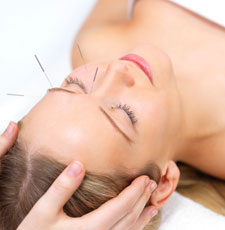
acupuncture face lifting
A major tenet of acupuncture is that to reflect beauty on the outside, you must be healthy on the inside. Cosmetic acupuncture is a unique method of facial rejuvenation based on this philosophy. And its popularity is growing among women in America.
Principles of acupuncture
For starters, here are the basics of acupuncture.
- Blood and Qi flow.Acupuncture uses carefully-placed needles to promote blood flow and energy circulation. This energy is known as “Qi” or “Chi,” representing “the spiritual, emotional, mental and physical aspects of life,” according to the Web site, Acupuncture.Blood and Qi travel along channels and pathways throughout the body. When blood or Qi create blockages in certain parts of the body, it can have negative effects. Once these blockages are cleared, blood and energy flow improve, and well-being is restored.
- Balance. Due to its holistic nature, acupuncture focuses on the body as a whole and on the systems working together. In other words, if one part of the body isn’t working properly, it can affect other parts and cause imbalances.
How cosmetic acupuncture works
Cosmetic acupuncture — also known as acupuncture facial rejuvenation or an acupuncture facelift — is built on the same foundation as acupuncture, using many of the same theories.
It involves placing very fine, disposable surgical needles on certain points of the face — such as wrinkles around the mouth, forehead and eyes — and other parts of the body — such as the hands, arms, legs and feet.
“We treat the whole body, because what happens in your skin is a reflection of what’s going on in your body,” licensed acupuncturist Gira Patel tells U.S. News & World Report.
What proponents say
Advocates of acupuncture believe that these needles unblock Qi and blood flow to skin and may correct a myriad of skin problems. According to research that appeared in the International Journal of Clinical Acupuncture in 1996, 90 percent of 300 individuals who tried facial acupuncture saw positive results. These results included softening of facial lines, improvement in skin tone, reduction of under-eye circles and a general facial glow.
Proponents and practitioners of cosmetic acupuncture believe that:
- It shrinks sagging. Proponents say cosmetic acupuncture affects the muscles in the face, thereby decreasing sagging of facial skin.
- It softens and smooths. Facial rejuvenation acupuncture, a type of cosmetic acupuncture, is “effective in smoothing out lines, erasing shallow lines, and softening deeper furrows,” acupuncturist Della Aubrey-Miller, MAc, LAc, tells WebMD.
- It creates collagen and elastin. Acupuncture stimulates skin cells to create new collagen and elastin fibers, filling in fine lines and wrinkles.
It treats discoloration. Cosmetic acupuncture can clear up or minimize age spots and pigmentation problems.
What critics say
Overall, those in mainstream dermatology and cosmetic surgery don’t accept cosmetic acupuncture as an effective treatment. They believe:
- It’s a placebo. Critics believe cosmetic acupuncture produces a placebo effect: If you expect the treatment to work, you may think it has improved your skin, even if there’s no actual improvement.
It doesn’t boost collagen. Plastic surgeon and president of the American Society for Aesthetic Plastic Surgery Foad Nahai, M.D., tells U.S. News & World Report that, “It would take a heck of a lot of needle sticks, hundreds of them for a long time, to lead to collagen stimulation.”
It doesn’t improve wrinkles. In some cases, cosmetic acupuncture also uses electrical currents with the needles, which allegedly boosts muscle tone for a more youthful look. However, plastic surgeon Richard D’Amico, M.D., disagrees. He tells The New York Times that this will actually make wrinkles worse.
In addition, some have criticized acupuncture as a whole. According to the Web site, Quackwatch, the research on acupuncture’s benefits for medical concerns and conditions is insufficient. “However, the evidence supporting these claims consists mostly of practitioners’ observations and poorly designed studies,” writes Stephen Barrett, M.D.
He also provides a list of statements from the National Council Against Health Fraud (NCAHF), including: Acupuncture’s “theory and practice are based on primitive and fanciful concepts of health and disease that bear no relationship to present scientific knowledge” and “Perceived effects of acupuncture are probably due to a combination of expectation, suggestion, counter- irritation, operant conditioning, and other psychological mechanisms.”
Acupuncture risks
Generally, when performed by a licensed and well-trained acupuncturist, acupuncture is safe. However, there are potential risks, including:
- Aching or pain after needles are inserted or positioned
- Allergic reactions and rashes from metal in the needles
- Bleeding
- Bruising
- Fainting
- Infections. However, licensed acupuncturists use disposable sterile needles to minimize this risk.
Acupuncture might not be safe if you: take certain medications or have seizures, migraines, high blood pressure or bleeding problems. Before seeing an acupuncturist, always talk it over with your physician.
The bottom line
Currently, there’s no research to show that cosmetic acupuncture is an effective anti-aging treatment, and it has many critics. But, there are clients who believe it delivers substantial benefits. If you’re interested in cosmetic acupuncture, your best bet is to consult your dermatologist.

 August 24, 2010 in
August 24, 2010 in 




